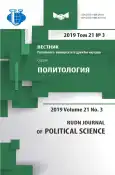Formal and Real Efficiency of Memory Policy (as Exemplified by Historical Cinematography of the Cold War Period)
- Authors: Belov S.I1
-
Affiliations:
- Central Museum of the Great Patriotic War 1941-1945
- Issue: Vol 21, No 3 (2019)
- Pages: 513-524
- Section: CURRENT PROBLEMS OF POLITICAL SCIENCE
- URL: https://journal-vniispk.ru/2313-1438/article/view/339723
- DOI: https://doi.org/10.22363/2313-1438-2019-21-3-513-524
- ID: 339723
Cite item
Full Text
Abstract
The article attempts to record and evaluate formal criteria for determining the effectiveness of the Cold War era Soviet films (box office revenue in the USSR, box office sales in the socialist countries, foreign currency take, number of viewers, number of positive letters from the audience to the authorities, number of professional favorable reviews, prizes and awards, positive evaluation of the Cinema Arts Council) as a tool for implementation of “memory policy” in the Soviet Union. During the period in question, there was no adequate system for assessing ideological work in the USSR. Formal criteria mainly focused on the number of viewers, ignoring the quality of message assimilation by the audience. Through the example of Soviet historical films, the article examines the practice of building collective and cultural memory in the context of pursuing a political objective. The author also proposes a list of criteria for assessing cinema as a tool for forming long-term ideas about the past, shaping an enemy’s image, and implementing the national memory policy.
Keywords
About the authors
Sergey I Belov
Central Museum of the Great Patriotic War 1941-1945
Author for correspondence.
Email: belov2006s@yandex.ru
PhD in History, Scientific Secretary
Moscow, Russian FederationReferences
- Belov S.I. Anti-Soviet Films from the West: The Secret of Popularity Among Russians (On the Materials of American Cinema of the 1980-s). Materials of the VIII All-Russian Congress of Political Scientists. Moscow; 6—8 December 2018: 62—63 (In Russ.).
- Karusheva Yu.M. Current Films of the Cold War: A Comparative Analysis. Social Competence. 2018; 12: 76—83 (In Russ.).
- Kolesnikova A.G. Game Cinema of the mid-1950s — mid-1980s as a Means of Soviet Propaganda: The Create and Actualization of the Image of the Enemy. Old Years. 2011; 1: 68—76 (In Russ.).
- Kolesnikova A.G. “Fight After Victory”: The Image of the Enemy in the Soviet Game Cinema of the Cold War Period. Moscow: RSUH; 2015. 230 p. (In Russ.).
- Kolesnikova A.G. The Image of the Enemy of the Cold War Period in Detective-Adventure Films of the 1950s—1980s: Audience and the Problem of Historical Memory. Bulletin of Peoples' Friendship University of Russia. Series: History of Russia. 2009; 3: 144—153 (In Russ.).
- Magidov V.M. Film and Photo Documents in the Context of Historical Knowledge. Moscow: RSUH; 2005. 394 p. (In Russ.).
- Rukavishnikov V.O. Cold War, Cold Peace. Public Opinion in the USA and Europe about the USSR/Russia, Foreign Policy and Security of the West. Moscow: Akademicheskii Prospekt; 2005. 864 p. (In Russ.).
- Ryabova T.B., Ryabov O.V. Stereotyping as a Mechanism of Symbolic Politics. Herzen’s Readings 2018. Actual Issues of Political Knowledge. Collection of Scientific Papers. A.I. Herzen Russian State Pedagogical University, Faculty of Social Sciences. St. Petersburg; 2018; Vol. 1: 23—28 (In Russ.).
- Smirnov D.G. The War of Forms in the Symbolic Politics of the Cold War: Semiological Aspects. Bulletin of Ivanovo State University. Series: Humanities. 2019; 2: 60—68 (In Russ.).
- Stishova E., Sirivlya N. Nightingales on 17th Street [Scientific Research about Anti-Americanism in Soviet Cinema, Pittsburg University, May 2003]. Art of Cinema. 2003; 10: 5—21 (In Russ.).
- Talal A. Myth and Life in the Cinema: Meanings and Instruments of Dramatic Language. Moscow: Al'pina non-fikshn; 2018. 394 p. (In Russ.).
- Fateev A.V. The Image of the Enemy in the Soviet Propaganda of 1945—1954. Moscow: Institute of Russian History, Russian Academy of Sciences; 1999. 261 p. (In Russ.).
- Fedorov A.V. Reflections: The West about Russia / Russia about the West. Movie Images of Countries and People. Moscow: Publishing house “Information for All”; 2017. 389 p. (In Russ.).
- Fedorov A.V. Comparative Analysis of Media Stereotypes of the Cold War and Ideological Confrontation (1946—1991). Media Education. 2009; 4: 62—85 (In Russ.).
- Chistyakova V.O. National Military Cinema of 1911—2011: Media of Memory. Cultural Journal. 2012; 3: 1—14 (In Russ.).
- Yudin K.A. “The Image of the Enemy” and the Atmosphere of “Cold Opposition” in Foreign Cinema of the 1960s — 1970s. Dialogue with Time. 2019; Vol. 67: 178—194 (In Russ.).
- Yakobidze-Gitman A. Rise of Phantasms: The Stalin Era in Post-Soviet Cinema. Moscow: New Literary Review; 2015. 312 p. (In Russ.).
- Babitsky P., Rimberg J. The Soviet Film Industry. N.Y.: Praeger; 1955. 377 p.
- Condee N. The Imperial Trace: Recent Russian Cinema. New York: Oxford University Press; 2009. 360 p.
- Davies S. Soviet Cinema in the Early Cold War: Pudovkin’s Admiral Nakhimov in Context. Across the Blocs: Cold War Cultural and Social History. Ed. by P. Major and R. Mitter. L.; 2004: 39—55.
- Kenez P. Cinema and Soviet Society, 1917—1953. Cambridge, N.Y.: Cambridge University Press; 1992. 281 p.
- Kenez P. The Picture of the Enemy in Stalinist Films. Insiders and Outsiders in Russian Cinema. Ed. by S.M. Norris, Z.M. Torlone. Indiana University Press; 2008: 96—112.
- La Feber W. America, Russia and Cold War. New York: Alfred A. Knopf; 1990. 512 p.
- Parish J.R., Pitts M.R. The Great Spy Pictures. Metuchen, N.J.: The Scarecrow Press; 1974. 585 p.
- Robin R.T. The Making of the Cold War Enemy. Princeton, Oxford: Princeton University Press; 2001. 277 p.
- Shaw T., Youngblood D. Cold War Sport, Film, and Propaganda: A Comparative Analysis of the Superpowers. Journal of Cold War Studies. 2017; Vol. 19; 1: 160—192.
- Shaw T., Youngblood D.J. Cinematic Cold War: The American and Soviet Struggle for Heart and Minds. Lawrence: University Press of Kansas; 2010. 301 p.
- Shlapentokh D. Soviet Cinematography 1918—1991: Ideological Conflict and Social Reality. N.Y.: Aldine de Gruyter; 1993. 278 р.
- Small M. Hollywood and Teaching about Russian-American Relations. Film and History. 1980; 10: 1—8.
Supplementary files









